Nos4a2 Read online
DEDICATION
To my mom—here’s a mean machine for the story queen
EPIGRAPH
Die Todten reiten schnell.
(For the dead travel fast.)
—“LENORE,” GOTTFRIED BÜRGER
CONTENTS
Dedication
Epigraph
Prologue: Season’s Greetings, December 2008
FCI Englewood, Colorado
Shorter Way, 1986–1989
Haverhill, Massachusetts
Terry’s Primo Subs Hampton Beach, New Hampshire
Haverhill, Massachusetts
Home
Various Locales
Spicy Menace, 1990
Sugarcreek, Pennsylvania
NorChemPharm
Highway 322
The Road to Christmasland
The Pennsylvania Countryside
The Librarian, 1991
Haverhill, Massachusetts
The McQueen House
Here, Iowa
The Library
Haverhill, Massachusetts
As kingfishers catch fire, dragonflies dráw fláme
Disappearances, 1991–1996
Various Locales
Haverhill
Various Locales
Haverhill
Out in the Cold
Home
The Basement
Sleigh House, 1996
Haverhill
The Other End of the Bridge
A Mudroom
A Hallway
The Kitchen
The Pantry
The Laundry Chute
Out
Above Gunbarrel, Colorado
Sam’s Gas & Sundries
Interlude: The Spirit of Ecstasy, 2000–2012
Gunbarrel, Colorado
Sugarcreek, Pennsylvania
Gunbarrel, Colorado
Brandenburg, Kentucky
New York (and Everywhere Else)
FCI Englewood, Colorado
Denver, Colorado
Brandenburg, Kentucky
St. Luke’s Medical Center, Denver
Bad Mother, December 16, 2011–July 6, 2012
Lamar Rehabilitation Center, Massachusetts
Haverhill
Lake Winnipesaukee
The Carriage House
Haverhill
Lake Winnipesaukee
Haverhill
By the Road
The Other Side of the Door
Boston
Beside the Bay
I-95
Lake Winnipesaukee
Gravel Driveway
Route 3
The Lake House
Route 3
The Lake House
Under
The Yard
Logan Airport
Lake Winnipesaukee
Search Engine, July 6–7
The Lake
The Lake
The Kitchen
The Bedroom
The St. Nicholas Parkway
Sugarcreek, Pennsylvania
The Lake
The House of Sleep
Bing’s Garage
The Lake
The House of Sleep
Route 3, New Hampshire
Shorter Way
The House of Sleep
Christmasland, July 7–9
The St. Nicholas Parkway
Indiana
The House of Sleep
Shoot the Moon Fireworks, Illinois
The House of Sleep
Laconia, New Hampshire
Here, Iowa
The Library
Laconia
Here, Iowa
Hampton Beach, New Hampshire
Real Life
The Dark
Dover, New Hampshire
Christopher McQueen’s House
Outside
Inside
Out Back
The Sleigh House
In the Trees
Triumph, One Eternal Christmas Eve
Christmasland
Beneath the Great Tree
Gumdrop Lane
Come All Ye Faithful, October
Gunbarrel
Acknowledgments
About the Author
Also By Joe Hill
Credits
Copyright
About the Publisher
PROLOGUE:
SEASON’S GREETINGS
DECEMBER 2008
FCI Englewood, Colorado
NURSE THORNTON DROPPED INTO THE LONG-TERM-CARE WARD A little before eight with a hot bag of blood for Charlie Manx.
She was coasting on autopilot, her thoughts not on her work. She had finally made up her mind to buy her son, Josiah, the Nintendo DS he wanted, and was calculating whether she could get to Toys “R” Us after her shift, before they closed.
She had been resisting the impulse for a few weeks, on philosophical grounds. She didn’t really care if all his friends had one. She just didn’t like the idea of those handheld video-game systems that the kids carried with them everywhere. Ellen Thornton resented the way little boys disappeared into the glowing screen, ditching the real world for some province of the imagination where fun replaced thought and inventing creative new kills was an art form. She had fantasized having a child who would love books and play Scrabble and want to go on snowshoeing expeditions with her. What a laugh.
Ellen had held out as long as she could, and then, yesterday afternoon, she had come across Josiah sitting on his bed pretending an old wallet was a Nintendo DS. He had cut out a picture of Donkey Kong and slipped it into the clear plastic sleeve for displaying photographs. He pressed imaginary buttons and made explosion sounds, and her heart had hurt a little, watching him make believe he already had something he was certain he would get on the Big Day. Ellen could have her theories about what was healthy for boys and what wasn’t. That didn’t mean Santa had to share them.
Because she was preoccupied, she didn’t notice what was different about Charlie Manx until she was easing around his cot to reach the IV rack. He happened to sigh heavily just then, as if bored, and she looked down and saw him staring up at her, and she was so startled to see him with his eyes open that she bobbled the sack of blood and almost dumped it on her feet.
He was hideous-old, not to mention hideous. His great bald skull was a globe mapping an alien moon, continents marked by liver spots and bruise-colored sarcomas. Of all the men in the long-term-care ward—a.k.a. the Vegetable Patch—there was something particularly awful about Charlie Manx with his eyes open at this time of year. Manx liked children. He’d made dozens of them disappear back in the nineties. He had a house below the Flatirons where he did what he liked with them and killed them and hung Christmas ornaments in their memory. The papers called the place the Sleigh House. Ho, ho, ho.
For the most part, Ellen could shut off the mother side of her brain while she was at work, could keep her mind away from thoughts of what Charlie Manx had probably done with the little girls and boys who had crossed his path, little girls and boys no older than her Josiah. Ellen didn’t muse on what any of her charges had done, if she could help it. The patient on the other side of the room had tied up his girlfriend and her two children, set fire to their house, and left them to burn. He was arrested in a bar down the street, drinking Bushmills and watching the White Sox play the Rangers. Ellen didn’t see how dwelling on it was ever going to do her any favors, and so she had taught herself to think of her patients as extensions of the machines and drip bags they were hooked up to: meat peripherals.
In all the time she’d been working at FCI Englewood, in the Supermax prison infirmary, she had never seen Charlie Manx with his eyes open. She’d been on staff for three years, and he had been comatose all that time. He was the frailest of her patients, a f
ragile coat of skin with bones inside. His heart monitor blipped like a metronome set to the slowest possible speed. The doc said he had as much brain activity as a can of creamed corn. No one had ever determined his age, but he looked older than Keith Richards. He even looked a little like Keith Richards—a bald Keith with a mouthful of sharp little brown teeth.
There were three other coma patients in the ward, what the staff called “gorks.” When you were around them long enough, you learned that all the gorks had their quirks. Don Henry, the man who burned his girl and her kids to death, went for “walks” sometimes. He didn’t get up, of course, but his feet pedaled weakly under the sheets. There was a guy named Leonard Potts who’d been in a coma for five years and was never going to wake up—another prisoner had jammed a screwdriver through his skull and into his brain. But sometimes he cleared his throat and would shout “I know!” as if he were a small child who wanted to answer the teacher’s question. Maybe opening his eyes was Manx’s quirk and she’d just never caught him doing it before.
“Hello, Mr. Manx,” Ellen said automatically. “How are you feeling today?”
She smiled a meaningless smile and hesitated, still holding the sack of body-temperature blood. She didn’t expect a reply but thought it would be considerate to give him a moment to collect his nonexistent thoughts. When he didn’t say anything, she reached forward with one hand to slide his eyelids closed.
He caught her wrist. She screamed—couldn’t help it—and dropped the bag of blood. It hit the floor and exploded in a crimson gush, the hot spray drenching her feet.
“Ugh!” she cried. “Ugh! Ugh! Oh, God!”
It smelled like fresh-poured iron.
“Your boy, Josiah,” Charlie Manx said to her, his voice grating and harsh. “There’s a place for him in Christmasland, with the other children. I could give him a new life. I could give him a nice new smile. I could give him nice new teeth.”
Hearing him say her son’s name was worse than having Manx’s hand on her wrist or blood on her feet. (Clean blood, she told herself, clean.) Hearing this man, convicted murderer and child molester, speak of her son made her dizzy, genuinely dizzy, as if she were in a glass elevator rushing quickly into the sky, the world dropping away beneath her.
“Let go,” she whispered.
“There’s a place for Josiah John Thornton in Christmasland, and there’s a place for you in the House of Sleep,” Charlie Manx said. “The Gasmask Man would know just what to do with you. Give you the gingerbread smoke and teach you to love him. Can’t bring you with us to Christmasland. Or I could, but the Gasmask Man is better. The Gasmask Man is a mercy.”
“Help,” Ellen screamed, except it didn’t come out as a scream. It came out as a whisper. “Help me.” She couldn’t find her voice.
“I’ve seen Josiah in the Graveyard of What Might Be. Josiah should come for a ride in the Wraith. He’d be happy forever in Christmasland. The world can’t ruin him there, because it isn’t in the world. It’s in my head. They’re all safe in my head. I’ve been dreaming about it, you know. Christmasland. I’ve been dreaming about it, but I walk and walk and I can’t get to the end of the tunnel. I hear the children singing, but I can’t get to them. I hear them shouting for me, but the tunnel doesn’t end. I need the Wraith. Need my ride.”
His tongue slipped out of his mouth, brown and glistening and obscene, and wet his dry lips, and he let her go.
“Help,” she whispered. “Help. Help. Help.” She had to say it another time or two before she could say it loud enough for anyone to hear her. Then she was batting through the doors into the hall, running in her soft flat shoes, screaming for all she was worth. Leaving bright red footprints behind her.
Ten minutes later a pair of officers in riot gear had strapped Manx down to his cot, just in case he opened his eyes and tried to get up. But the doctor who eventually arrived to examine him said to unlash him.
“This guy has been in a bed since 2001. He has to be turned four times a day to keep from getting sores. Even if he wasn’t a gork, he’s too weak to go anywhere. After seven years of muscle atrophy, I doubt he could sit up on his own.”
Ellen was listening from over next to the doors—if Manx opened his eyes again, she planned to be the first one out of the room—but when the doctor said that, she walked across the floor on stiff legs and pulled her sleeve back from her right wrist to show the bruises where Manx had grabbed her.
“Does that look like something done by a guy too weak to sit up? I thought he was going to yank my arm out of the socket.” Her feet stung almost as badly as her bruised wrist. She had stripped off her blood-soaked pantyhose and gone at her feet with scalding water and antibiotic soap until they were raw. She was in her gym sneakers now. The other shoes were in the garbage. Even if they could be saved, she didn’t think she’d ever be able to put them on again.
The doctor, a young Indian named Patel, gave her an abashed, apologetic look and bent to shine a flashlight in Manx’s eyes. His pupils did not dilate. Patel moved the flashlight back and forth, but Manx’s eyes remained fixed on a point just beyond Patel’s left ear. The doctor clapped his hands an inch from Manx’s nose. Manx did not blink. Patel gently closed Manx’s eyes and examined the reading from the EKG they were running.
“There’s nothing here that’s any different from any of the last dozen EKG readings,” Patel said. “Patient scores a nine on the Glasgow scale, shows slow alpha-wave activity consistent with alpha coma. I think he was just talking in his sleep, Nurse. It even happens to gorks like this guy.”
“His eyes were open,” she said. “He looked right at me. He knew my name. He knew my son’s name.”
Patel said, “Ever had a conversation around him with one of the other nurses? No telling what the guy might’ve unconsciously picked up. You tell another nurse, ‘Oh, hey, my son just won the spelling bee.’ Manx hears it and regurgitates it mid-dream.”
She nodded, but a part of her was thinking, He knew Josiah’s middle name, something she was sure she had never mentioned to anyone here in the hospital. There’s a place for Josiah John Thornton in Christmasland, Charlie Manx had said to her, and there’s a place for you in the House of Sleep.
“I never got his blood in,” she said. “He’s been anemic for a couple weeks. Picked up a urinary-tract infection from his catheter. I’ll go get a fresh pack.”
“Never mind that. I’ll get the old vampire his blood. Look. You’ve had a nasty little scare. Put it behind you. Go home. You only have, what? An hour left on your shift? Take it. Take tomorrow, too. Got some last-minute shopping to finish? Go do it. Stop thinking about this and relax. It’s Christmas, Nurse Thornton,” the doctor said, and winked at her. “Don’t you know it’s the most wonderful time of the year?”
SHORTER WAY
1986–1989
Haverhill, Massachusetts
THE BRAT WAS EIGHT YEARS OLD THE FIRST TIME SHE RODE OVER THE covered bridge that crossed the distance between Lost and Found.
It happened like this: They were only just back from The Lake, and the Brat was in her bedroom, putting up a poster of David Hasselhoff—black leather jacket, grinning in that way that made dimples in his cheeks, standing with his arms crossed in front of K.I.T.T.—when she heard a sobbing cry of shock in her parents’ bedroom.
The Brat had one foot up on the headboard of her bed and was holding the poster to the wall with her chest while she pinned down the corners with brown tape. She froze, tilted her head to listen, not with any alarm, just wondering what her mother was worked up about now. It sounded like she had lost something.
“—had it, I know I had it!” she cried.
“You think you took it off down by the water? Before you went in the lake?” asked Chris McQueen. “Yesterday afternoon?”
“I told you already I didn’t go swimming.”
“But maybe you took it off when you put on suntan lotion.”
They continued to go back and forth along these lines, but the Br
at decided for the time being that she could tune them out. At the age of eight, the Brat—Victoria to her second-grade teacher, Vicki to her mother, but the Brat to her father and in her heart—was well beyond being alarmed by her mother’s outbursts. Linda McQueen’s gales of laughter and overwrought cries of disappointment were the soundtrack of the Brat’s everyday life and were only occasionally worth noticing.
She smoothed the poster flat, finished taping it, and stepped back to admire it. David Hasselhoff; so cool. She was frowning, trying to decide if it was crooked, when she heard a door slam and another anguished cry—her mother again—and then her father’s voice.
“Didn’t I know we were headed here?” he said. “Right on cue.”
“I asked if you checked the bathroom, and you said you did. You said you had everything. Did you check the bathroom or not?”
“I don’t know. No. Probably not. But it doesn’t matter ’cause you didn’t leave it in the bathroom, Linda. Do you know why I know you didn’t leave your bracelet in the bathroom? Because you left it on the beach yesterday. You and Regina Roeson had yourselves a bunch of sun and a bucketful of margaritas, and you got so relaxed you kind of forgot you had a daughter and dozed off. And then when you woke up and you realized you were going to be an hour late to pick her up from day camp—”
“I was not an hour late.”
“—you left in a panic. You forgot the suntan lotion, and you forgot your towel, and you forgot your bracelet, too, and now—”
“And I wasn’t drunk either, if that’s what you’re implying. I don’t drive our daughter drunk, Chris. That’s your specialty—”
“—and now you’re pulling your usual shit and making it someone else’s fault.”
The Brat was hardly aware she was moving, wandering into the dim front hall and toward her parents’ bedroom. The door was open about half a foot, revealing a slice of her parents’ bed and the suitcase lying on top of it. Clothes had been pulled out and scattered across the floor. The Brat knew that her mother had, in a spasm of strong feeling, started yanking things out and throwing them, looking for the lost bracelet: a golden hoop with a butterfly mounted upon it, made from glittering blue sapphires and ice-chip diamonds.

 The Fireman
The Fireman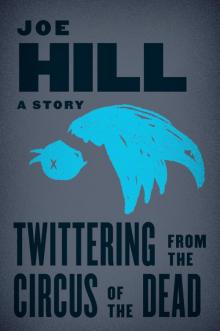 Twittering From the Circus of the Dead
Twittering From the Circus of the Dead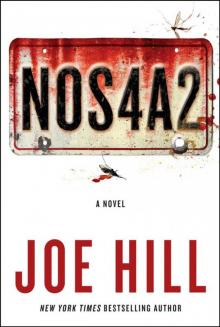 Nos4a2
Nos4a2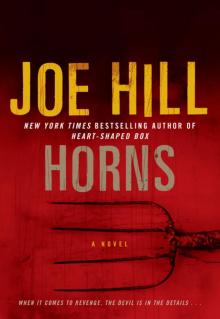 Horns
Horns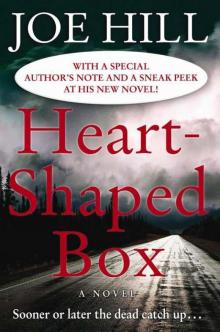 Heart-Shaped Box
Heart-Shaped Box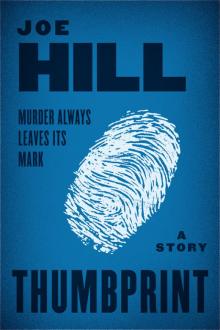 Thumbprint: A Story
Thumbprint: A Story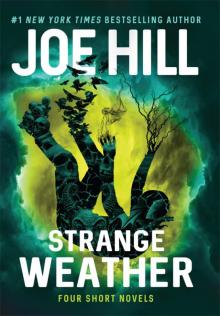 Strange Weather
Strange Weather 20th Century Ghosts
20th Century Ghosts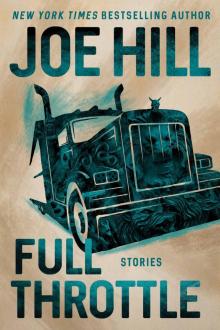 Full Throttle
Full Throttle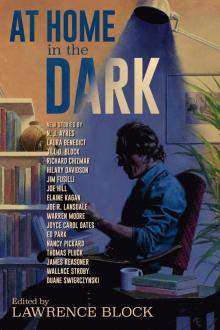 At Home in the Dark
At Home in the Dark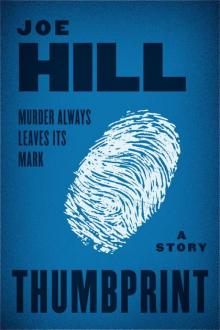 Thumbprint
Thumbprint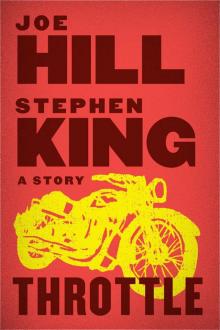 Throttle
Throttle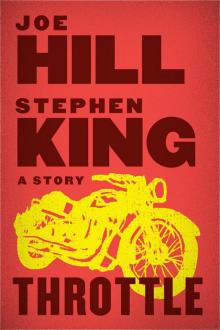 Throttle (Kindle Single)
Throttle (Kindle Single)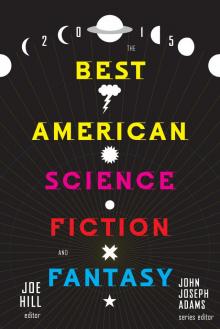 The Best American Science Fiction and Fantasy 2015
The Best American Science Fiction and Fantasy 2015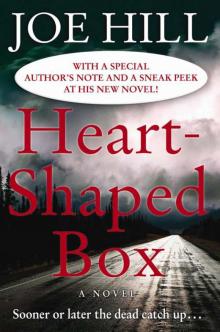 Heart-Shaped Box with Bonus Material
Heart-Shaped Box with Bonus Material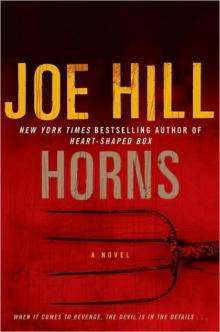 Horns: A Novel
Horns: A Novel